It’s ‘Ilima’-Nation Time
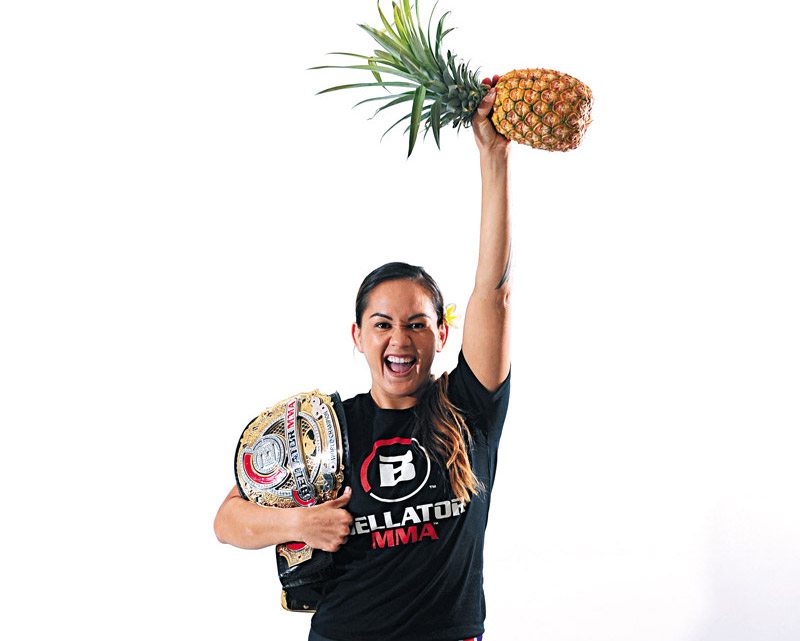
Ilima-Lei Macfarlane expects to raise more than just a pineapple after Saturday’s fight against Bellator foe Valérie Létourneau. Photo by Lawrence Tabudlo.
The woman sporting tattoos on her forearm, thigh and back and boasting colorful nicknames such as “The Ilimanator” and “The Pineapple Princess” is clearly one of the baddest fighters on the planet. Yet who knew Bellator MMA fly-weight champ Ilima-Lei Macfarlane would become a badass so soon after turning pro? Certainly not her. After all, we’re talking about a thinker, an academic, a master’s degree holder here — not some brawler from birth.
As Macfarlane says about her surprisingly harmonious upbringing, “I grew up in a household where we didn’t watch any sort of fighting. We didn’t even fight amongst ourselves.”
But fight she will inside the house that Neal S. Blaisdell built on Saturday evening, Dec. 15. That’s when Macfarlane performs for the first time before her hometown crowd in the main event of Bellator 213. It’ll also be the first time she returns as an athlete to the confines of Blaisdell Arena, where she competed in the state high school girls wrestling tournament during her senior year at Punahou.
Macfarlane, who’s made San Diego her home for the past decade, enters this weekend’s match with a spotless 8-0 record, with nearly all of her victims “Ilima”-nated via knockout or submission. And she looks and sounds eager to rumble.
Yet in an age of shameless self-promotion and pre-fight bravado, don’t expect her to mimic contemporaries and get into a war of words with her Canadian opponent Valérie Létourneau (10-6).
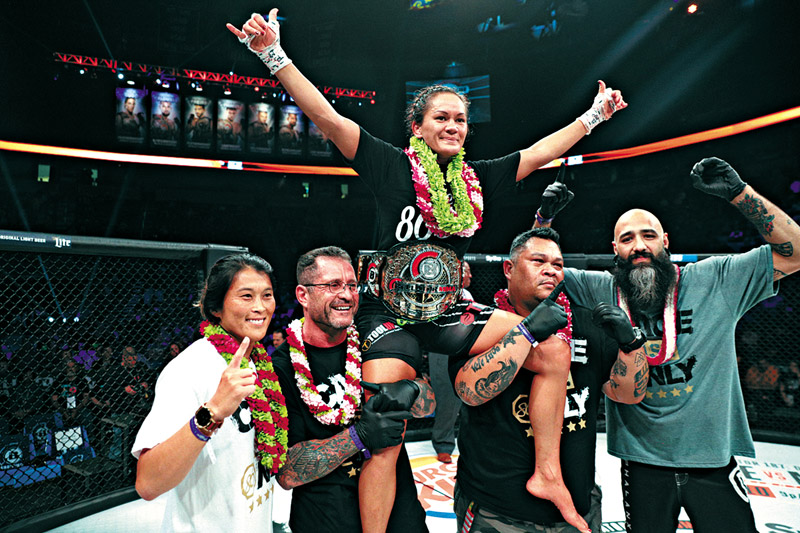
Riding the shoulders of her coaches and support team, Macfarlane celebrates her win over Alejandra Lara.
Making tantaran is simply not her style.
“I’m so not into trash-talking,” confesses Macfarlane, who’ll be defending her belt for the second time since submitting Emily Ducote and capturing the inaugural flyweight title at Bellator 186. “I’ll probably just give Valérie a lei before the fight.”
What fans can expect to see is the same type of fighter she’s been since turning pro a mere four years ago: calm, disciplined and tactical in her preparation and execution, with a reliance on her cerebral powers to outsmart foes rather than attempt to muscle them into submission.
“I’m not the strongest, most explosive fighter in the cage. I mean, I can barely do a push-up … I can’t even do a pull-up!” she snorts.
“But I’m smart and I listen to my coaches. If there’s an adjustment that needs to be made, I’ll make it. A lot of fighters fight off of emotion, which can be bad because they only see red once they get punched in the face or the opponent gets in their head.
“I’m not like that. I’m composed … calculating.”
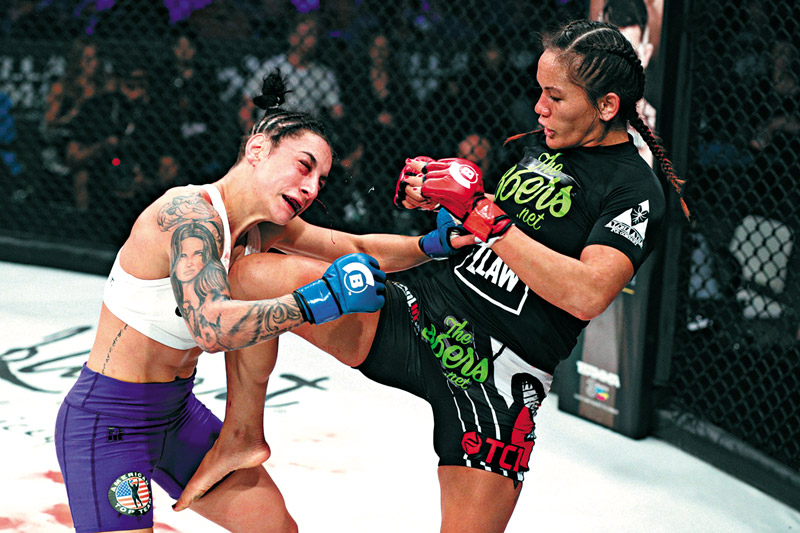
Macfarlane’s moves: Delivering a well-timed knee to the chin of Emily Ducote at Bellator 186
About the only person to have disrupted Macfarlane’s methodical approach to combat and raised her ire was Katie Castro, the media-dubbed “Soccer Mom” who Macfarlane tussled with in her professional debut in California. The 2015 match, which lasted all of 10 seconds and culminated with consecutive rights from Macfarlane that sent the much-larger Castro down to the canvas and off to la-la land, became an instant viral success with more than 1 million views.
Yet the outcome also produced an unanticipated backlash from fight fans who criticized Macfarlane for taking on an inferior opponent. Even the California State Athletic Commission inserted itself into the post-fight fray by investigating the organizer, Xplode Fight Series, and its previously un-sanctioned events.
Despite the adverse reactions, Macfarlane was savvy enough to understand that even negative publicity would be a boon to her fledgling career, simply because it kept a then unknown fighter like her in the spotlight. It was sort of like when she posed for her first Bella-tor weigh-in in a Boom Boom Brazil bikini featuring a pineapple motif and was immediately given the moniker “The Pineapple Princess.” While she found the nickname cute, what really mattered was that she’d be on fans’ minds every time they looked at a pineapple.
“And in the end,” says Mcfarlane, “even with the amount of flak I was getting from the (Castro) fight, it was all good because it was still publicity for me.”
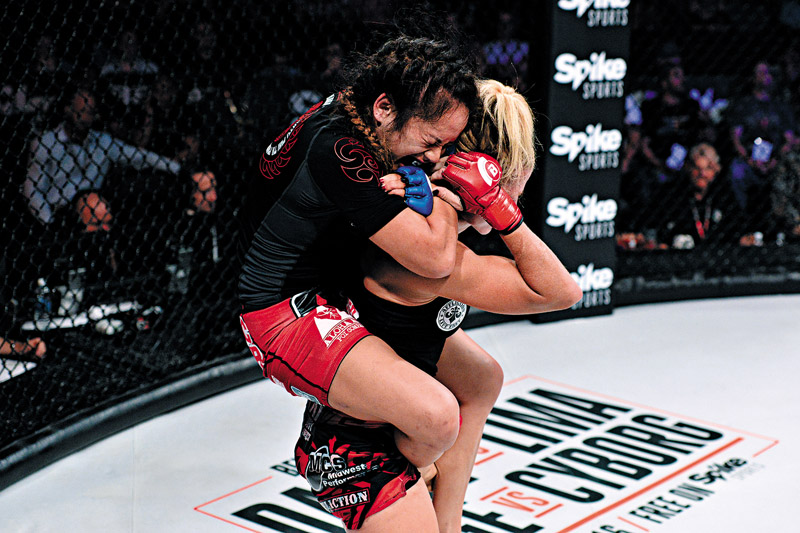
A standing rear-naked choke to Rebecca Ruth at Bellator 157.
If there were clues along the way that Macfarlane was destined for the rough and tumble world of mixed martial arts, they should have been found in her tenacious, fearless style of play as a youth on courts, fields and mats around O‘ahu. A multi-sport athlete who loved soccer and volleyball, she especially excelled on the hardwood.
“Basketball was my No. 1 sport growing up. I wanted to play college basketball, so I did all the clinics like Kalākaua from the time I was young,” states Macfarlane, who was raised in Nu‘uanu by parents Walter and Martha Macfarlane, and whose older sister, Milia, was a standout player for Punahou and a two-year starting point guard for University of Hawai‘i in the mid-2000s.
And although her last name is synonymous with paddling — The Walter J. Macfarlane Memorial Canoe Regatta, which is held every Fourth of July at Waikīkī Beach and attracts hundreds of paddlers and thousands of spectators, is named after her famous ancestor — Macfarlane confesses that water sports were never an option for her.
“I don’t surf, I don’t paddle,” she says, adding that her immediate family members were more “land mammals” who preferred to worship at the hoops altar together.
Or, as she succinctly states, “Basketball was our church on Sundays.”
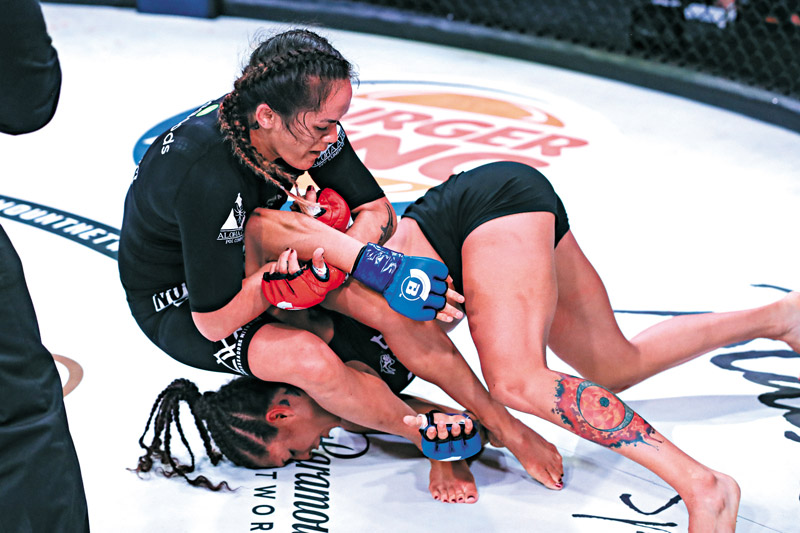
An armbar submission to Alejandra Lara at Bellator 201.
Unfortunately, multiple ACL and MCL injuries to her left knee during her freshman and sophomore years permanently removed her from the hardwood and forced Macfarlane to look elsewhere for her athletic fix. Undaunted by fate, she traded in her basketball shorts for grappling tights. Wrestling, it turns out, was a sport she had been doing since the third grade and came naturally to her. Competing on the Buffanblu varsity team, Macfarlane wound up finishing second in the state girls wrestling tournament as a sophomore and junior before breaking through in a big way as a senior by winning the 155-pound weight division title.
Yet for some reason, this lifelong athlete simply gave up on fitness once she enrolled at San Diego State University. For the next four years, she did nothing except study and imbibe in the college party scene. “I was raging super hard,” admits the anthropology major. As an unintended result, she began packing on the pounds.
But prior to beginning pursuit of her master’s degree (with a focus on indigenous issues) during the summer of 2013, Macfarlane decided to finally do something about her body. In a life-altering moment, she joined San Diego Combat Academy and somehow determined the best way to lose weight was to sign up for an MMA class.
Suffice to say, dropping pounds never required such a rude awakening.
Her training partner, veteran MMA fighter Liz Carmouche, was the first to administer a beating on the inexperienced Macfarlane. “I cried afterwards; I mean I had never been hit before,” she admits.
Rocked but undeterred, Macfarlane got up off the mat and chose to continue her sessions. “I was like ‘whatevers.’ I knew at that moment that no one would ever punch me as hard as Liz did that day.”
Soon, her weight began to drop (today, the 5-foot-4 fighter weighs in at a svelte 125 pounds) and requests to showcase her growing MMA skills at smokers (in-house fights) began. She gladly accepted the invites and proceeded to win all five of her amateur bouts. Then, following her match with Castro, Bellator called and offered her a contract. It was time, they said, for her to join the big girls.
“So the first thing I did was call my mom and dad and ask if it would be OK if I tried MMA out,” recalls Macfarlane. “I told them it wasn’t going to be forever, that maybe it’ll just be a couple of fights. My dad was like, ‘ Yeah, yeah, that sounds good.’ But my mom was like, ‘What?! We spent a lot of money putting you through school!'”
Thankfully, time has a way of softening people’s stances.
“Now, Mom’s in the front row of all my fights getting crazy,” notes Macfarlane, laughing. “I like to say that I get my fighting side from my mom because she grew up in Wai‘anae.”
At 28, Macfarlane is considered to be in the prime of her career. And even though she only has two years remaining on her Bellator contract, nothing appears to be pushing her toward an early retirement — other than maybe starting a family.
“In the beginning, I said I would wait until I turned 30 before I would give up (professional fighting). I thought that might be a good time to start having babies,” she says. “But now that I’m doing pretty well and making a career out of this — and also because I’m super single — well, I don’t think that having babies is a possibility at the moment!
“So … .” She pauses briefly to focus her thoughts, as if calculating her next move against an opponent. “I guess I’ll just keep riding this wave until it’s finally time to settle down and start having a family.”
LET’S GET IT ON
Hawai‘i’s Ilima-Lei Macfarlane (8-0) will defend her Bellator MMA women’s flyweight title against No. 1 contender Valérie Létourneau (10-6) in the co-main event of Bellator 213, scheduled for 7 p.m. Saturday (Dec. 15) at Blaisdell Arena.
The other co-main event features the promotional debut of Lyoto Machida (24-8) against Rafael Carvalho (15-2) in a middleweight tilt, while a pair of undefeated welterweights — Neiman Gracie (8-0) and Ed Ruth (6-0) — do battle in the evening’s opening bout.
Tickets may be purchased through bellator.com or ticketmaster.com.





